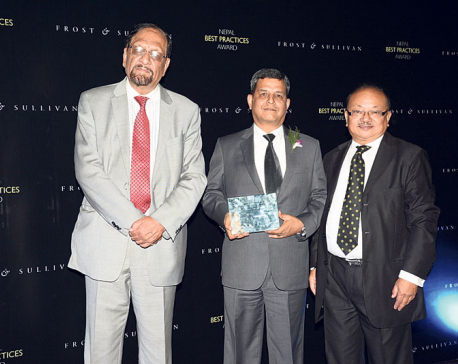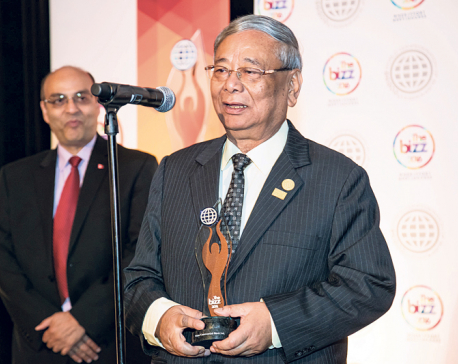
OR
CNI, Frost & Sullivan announce business excellence awards
Published On: August 11, 2017 03:31 AM NPT
KATHMANDU, August 11: Consulting firm Frost & Sullivan and Confederation of Nepalese Industries (CNI) on Thursday jointly announced Nepal Business Excellence Awards 2017.
The award will be conferred in Kathmandu on November 14 after assessment of company performances in sectors like manufacturing, trading, IT companies, Business Process Outsourcing/Knowledge Process Outsourcing, Hospital, Construction, Logistics, Hotel, and Banking, Financial Services and Insurance sectors, according to a statement issued by Frost & Sullivan.
The award will be given in four categories -- emerging business with annual turnover of less than Rs 30 million, medium businesses having annual turnover between Rs 30 million and Rs 250 million, large businesses with annual turnover between Rs 250 million and Rs 500 million and mega large businesses with annual turnover of more than Rs 500 million.
Companies can apply for the awards by September 5.
The organizers have said that the successful corporate with two core business focus -- profitability and sustainability -- are the basis of the selection. “Profitability is a short-term metric that reflects the ability of the business to meet its basic business objectives. However, sustainability is the demonstrated ability of building capability (systems) within the organization that will support desirable performance year-on-year,” they said in the statement.
Talking about the awards and partnership with Frost & Sullivan, CNI President Hari Bhakta Sharma said: “The country is heading toward policy stability, leading to steady economic growth and opening up vast investment and expansion opportunities for companies. Therefore, Nepali companies must adopt internationally-accepted systems to boost efficiency, output, competence, and corporate culture to stay relevant in the market."
Similarly, Nitin Kalothia, director of Frost & Sullivan said: “The award, through its incisive assessment process, will enhance awareness and accelerate adoption of global best practices in Nepali companies. This will further improve growth, profitability and competitiveness of the organizations.”
You May Like This

Nabil bags Frost & Sullivan award
KATHMANDU, Nov 15: Nabil Bank Ltd has been awarded with 'Frost & Sullivan Best Practices Award 2016 - Financial Institution of... Read More...

Prime Commercial Bank bags business excellence award
KATHMANDU, Aug 5: Prime Commercial Bank Ltd (PCBL) has bagged the 'The Bizz 2016 Business Excellence Award' from World Confederation... Read More...

Australia provides Alumni Excellence Awards
KATHMANDU, June 24: Six Australia Awards alumni were presented with Alumni Excellence Awards at an event held at Hotel Yak &... Read More...







Just In
- NRB to provide collateral-free loans to foreign employment seekers
- NEB to publish Grade 12 results next week
- Body handover begins; Relatives remain dissatisfied with insurance, compensation amount
- NC defers its plan to join Koshi govt
- NRB to review microfinance loan interest rate
- 134 dead in floods and landslides since onset of monsoon this year
- Mahakali Irrigation Project sees only 22 percent physical progress in 18 years
- Singapore now holds world's most powerful passport; Nepal stays at 98th











Leave A Comment